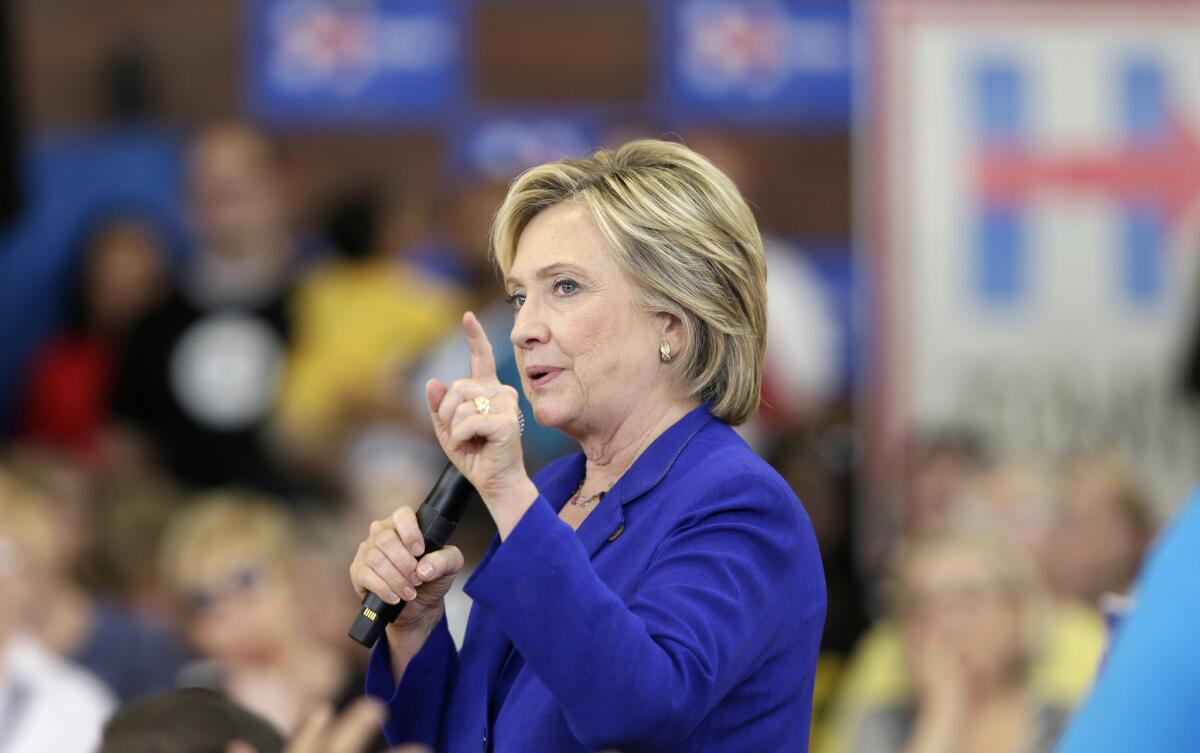New batch of Hillary Clintonâs emails shows her cautiousness on gay rights

Democratic presidential candidate Hillary Rodham Clinton speaks in Des Moines last week. Another group of private emails from her tenure as secretary of State has been released.
Reporting from Washington â Hillary Rodham Clinton has lately positioned herself on the forefront of gay rights, but tucked into a newly disclosed batch of her emails is a reminder that she had long taken a more cautious approach to the issue.
While secretary of State, Clinton personally intervened in early 2011 to reverse a policy change at the State Department that had been a symbolic gesture to nontraditional families, the messages show. She fretted that the change would give fodder to Fox News to attack her.
The email is one of 3,849 the State Department released Wednesday, as required by a judge in ongoing litigation over Clintonâs email. About 55,000 messages she sent or received from a private account are being vetted for classified information and disclosed in monthly batches.
TRAIL GUIDE: All the latest news on the 2016 presidential campaign >>
The fourth such batch was posted on the departmentâs website. As with previous Clinton email disclosures, most of the messages involved mundane matters of day-to-day government business. But every so often, a message sheds new light onto the life of one of the worldâs most powerful women.
An email involving passport applications was notable for the raw nerve the issue of gay rights seemed to touch. Clinton expressed anger that the application form had been changed from its reference to traditional parents, and she demanded to know who was behind it.
âWho made the decision that State will not use the terms âmother and fatherâ and instead substitute âparent one and twoâ?â she wrote.
âI am not defending that decision which I disagree w and knew nothing about in front of this Congress. ⦠We need to address this today or we will be facing a huge Fox generated media storm led by Palin et al.â
The form was changed.
The message was particularly revealing, but it was not the only one in which Clinton and aides exchanged thoughts on the type of media attention she might get.
A staffer forwarded to Clintonâs personal email account a gushing December 2010 note from magazine editor Tina Brown, making her pitch for how the secretary of Stateâs image could be enhanced with a cover story in Newsweek.
In another note, Clintonâs communications advisor at the department, Philippe Reines, alerted her to her 67% approval rating, and then remarked, âThis is why we cooperate with so many profiles.â
Other messages further illuminated Clintonâs fumbles with modern means of communication. She could not figure out why messages she was sending to one aide were going to the womanâs Gmail address instead of her government account.
Clinton said she did not know she even had the aideâs Gmail address, then jokingly blamed the confusion on Chinese hackers infiltrating her server.
The irony was quickly noted by GOP opposition researchers Wednesday. They have charged that Clintonâs use of a personal server for government business put the State Department at risk of a security breach -- and here Clinton was joking about the possibility.
In another exchange, Clinton expressed exasperation with a White House operator who did not believe it was her on the phone.
âIâm fighting w the WH operator who doesnât believe I am who I say and wants my direct office line even tho Iâm not there,â Clinton wrote in February of 2010. âI just [gave] him my home # and the State Dept # and I told him I had no idea what my direct office # was since I didnât call myself and I just hung up.â
Clinton might have invoked a slang term commonly used in government to describe a situation in which everything has gone wrong, but a later email revealed she was unfamiliar with it.
âWhat does fubar mean?â Clinton wrote to Cheryl Mills, then her chief of staff.
Mills responded: âFubar is unprintable on civil email.â
Though it was not surprising the term had come up. The exchange was about WikiLeaks. Further details were redacted from the document by State Department attorneys.
MORE FROM POLITICS
Ben Carsonâs open bias against Muslims a sign of coarse times
Trumpâs tax cuts could cost U.S. trillions of dollars, experts say
Planned Parenthood funding debate meets California congressional races
More to Read
Get the L.A. Times Politics newsletter
Deeply reported insights into legislation, politics and policy from Sacramento, Washington and beyond. In your inbox three times per week.
You may occasionally receive promotional content from the Los Angeles Times.











